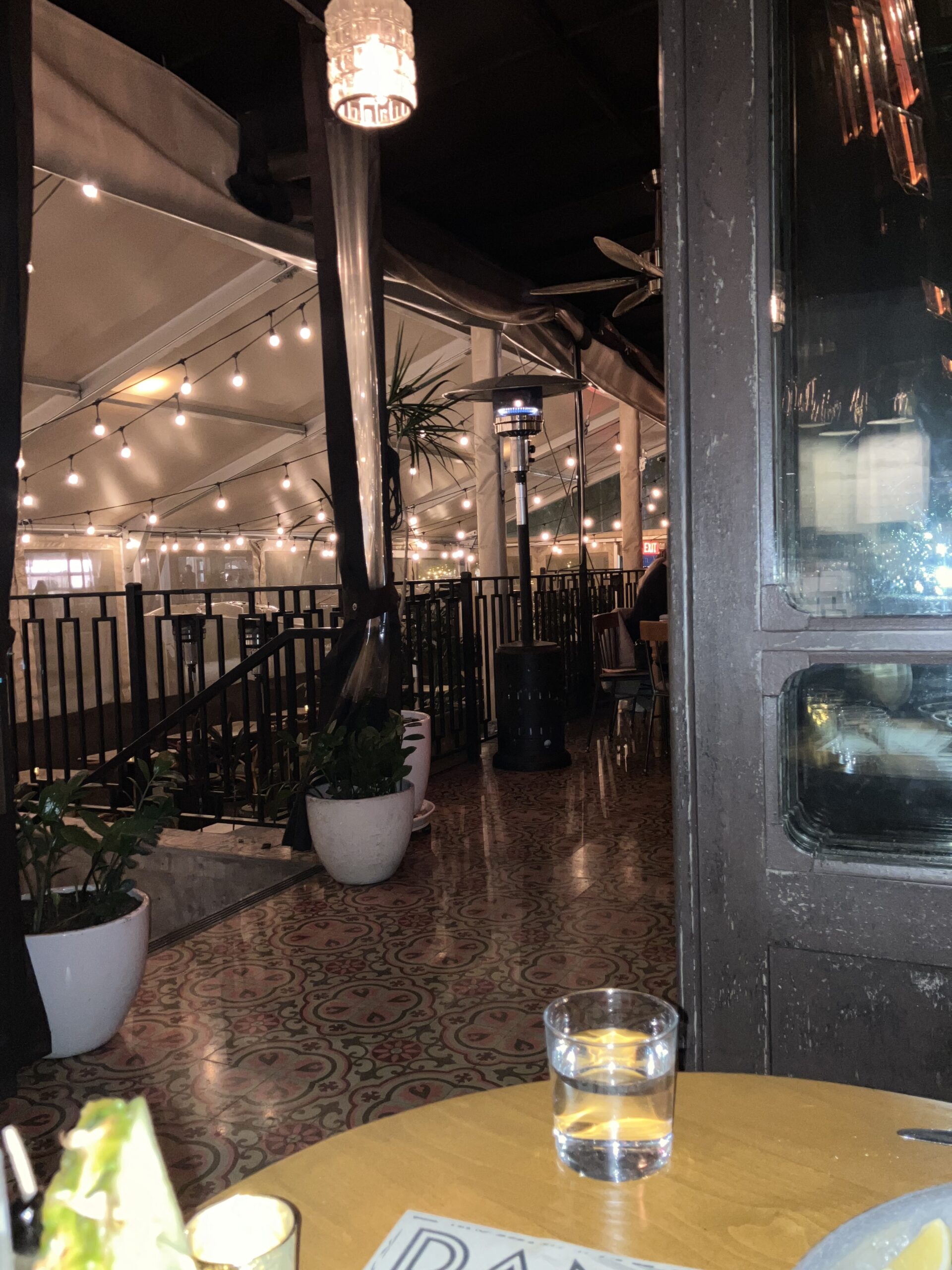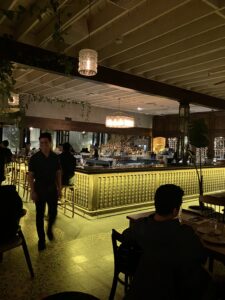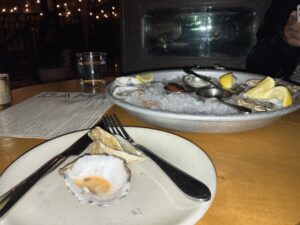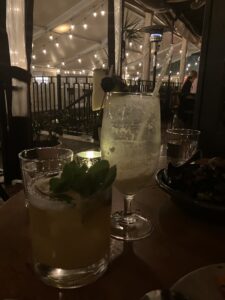Happiness only real when shared.
In the movie, Into the Wild, the main character graduates from a prestigious university only to abandon a seemingly promising future in law, leaving behind family and possessions to venture, alone, deep into the frigid isolation of the Alaskan wilderness. Even an eagerly willing Kristen Stewart he meets along the way couldn’t distract Alex from getting to his destination. Um, is this a restaurant review or what? Why is she suddenly talking about some random movie? While Into the Wild is undeniably a meditative, profound, and poignantly beautiful film/art, filled with panoramic shots of American natural formations (plus a few shots of American urban malformations; i.e., of Skid Row in Los Angeles—which, incidentally, looks like the neighborhood around DAMA), if you haven’t seen it, I can’t in all good conscience recommend that you do—it’s not exactly comforting entertainment. Like, it’s a good movie, but it’s not a feel good movie, if that makes sense? So, by reading the present synopsis, you’re getting the basic gist of the film without actually enduring over two hours of watching a young man go from eating a civilized meal at McCormick’s Fish House with his family, to cooking maggot-infested moose, to accidentally eating a poisonous wild plant, after which his “great Alaskan adventure” becomes a great Alaskan death camp. Dying from starvation and diarrhea, Alex writes the above quote into one of his cherished books: “Happiness only real when shared.” Thoreau was wrong, Alex realizes—true happiness resides not in a solitary communion with nature. After two years of running away from his loving, if flawed, family and the kind, strangers-turned-friends he meets on his journey toward what he imagined would be the most authentic kind of life, Alex’s final epiphany is that all the beauty of the Alaskan forest was meaningless without someone to share the experience with.
For our “Restaurant of the Month,” we dined at DAMA on the evening following Valentine’s, designating with our deliberate timing the evening as not merely another relaxing night out, but also a celebration of our decades-long friendship; to Charlie and I, this was a “Gal-entine’s” dinner. DAMA proved to be a fortunate choice for our Gal-entine’s celebration: For its flavorful food, delicious drinks, and comfortable ambiance, I would give this restaurant an A-. Despite the inevitable exhaustion of a Thursday evening—when we had both been weighed down by four grueling days at our jobs, and a mild soreness in my throat, which turned out to be an early sign of my first bout of COVID-19—it was a very pleasant dinner; a memory of good food and agreeable conversation that will bring a smile to our faces when recounted years from now: “Remember that time we went to DAMA and had those piña coladas? And then you tested positive for COVID the very next day?” Does dinner at a fancy restaurant invariably equate to a good time? Not necessarily; it depends on the company one shares that dinner with. Does a good time invariably transform into a happy memory? Not necessarily; it depends on whether one can share that memory with someone else who was there and can verify that the good time actually happened, and supply forgotten details if needed. Perhaps that is our underlying objective in making and maintaining our friendships: to stave off the piercing loneliness of having memories that no one else can corroborate. To tweak, slightly, the quote from the film mentioned earlier: Happy memories are only real when shared.
I do not have a lot of happy memories from my early years. But one rainy afternoon, when I was about 15, stands out as one of the highlights of my life. Not sure if I’m weird in this respect, but when I attempt to conjure up the most joyous moments of my life, the memories that come to mind are not of awards won or accolades received. Instead, they are mainly of mundane, even dreary days into which some unexpected element was introduced. On that particular rainy afternoon, I was loitering on my high school campus after the school day was over. I can’t recall why I didn’t immediately go home; perhaps the rain, which always complicates a commute, made me put off walking to the bus stop. For some reason, my best friend back then was still hanging around too, although she usually took the school bus home right after classes let out. The rain was coming down in relentless, yet annoyingly fine, curtains, when one of us—I forget who—suddenly stepped, deliberately and vigorously, into a deep puddle on the ground outside our history classroom. The resulting splash was satisfying, and the action was promptly repeated by the one and emulated by the other. Soon, the two of us began dancing around in the rain and jumping into puddles wherever the water accrued. I pretend-danced the ballet; I can’t even begin to describe what my friend, who never had a talent for movement at all, was doing. It was all very, very silly, but also, a moment of unalloyed joy.
My high school friend no longer remembers that afternoon. She no longer remembers much of anything. Years ago, she was diagnosed with a rare, degenerative disease that causes a host of horrible symptoms. The medication she has been taking to counter some of those symptoms, as pharmaceutical drugs are wont to do, created additional, equally devastating symptoms. One of those side effects is severe memory loss. I grieve for the confidante of my adolescence; I grieve for the degeneration of my friend’s body and the devolution of her mind. But I am ultimately a selfish creature, and if I’m honest, I’m also grieving for myself, for what I’ve lost due to her illness. We were the only two loitering students frolicking in the rain; my friend is no longer capable of confirming my memories of that afternoon, and no one else was there to witness it. When there’s no one alive with whom one can reminisce about a happy occurrence, did it actually happen?
We build, nurture, and preserve our relationships so that, as opportunities for making new memories to delight eventually dwindle with advancing age, we have people we can talk with about the good times that are scattered across the days of our lives; people who enjoyed those good times alongside us, who can attest to the laughter and the comedy, and compare their experience of events with our own. Ten, 20 years from now, if I want to talk about our dinner at DAMA—Charlie, you better still be taking my calls then, bitch!





